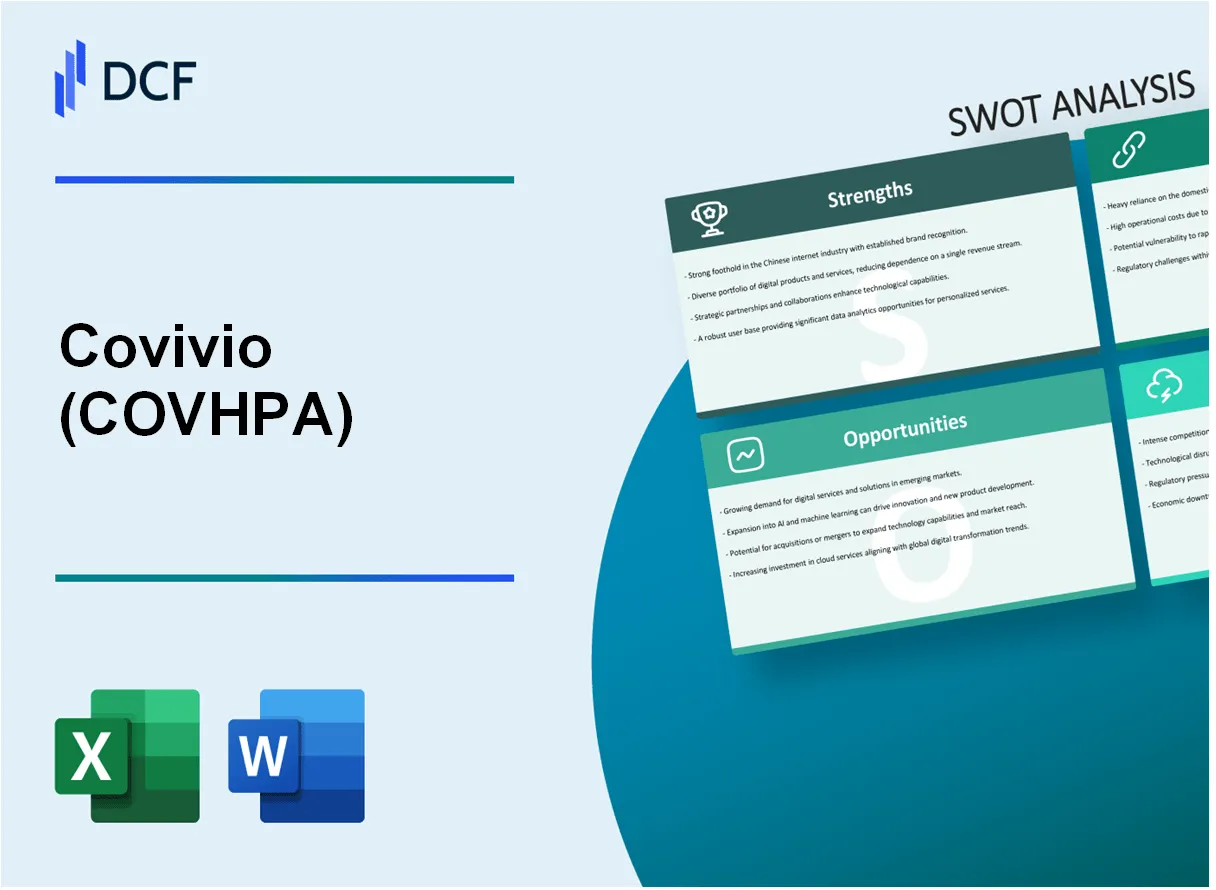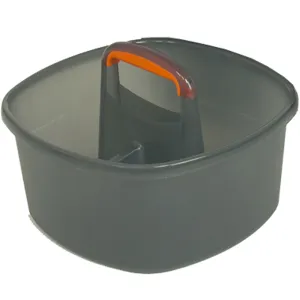In the ever-evolving landscape of the hospitality industry, Covivio Hotels stands at a crucial juncture, where a robust SWOT analysis reveals key insights into its strategic positioning. With strengths that capitalize on a diversified portfolio and strategic partnerships, but also weaknesses that expose vulnerabilities tied to tourism dependencies, the company navigates a complex environment of both opportunities and threats. Dive deeper to uncover how these elements shape Covivio's future in the competitive hotel market.
Covivio Hotels - SWOT Analysis: Strengths
Diversified portfolio across Europe enhances market presence. Covivio Hotels boasts a portfolio of over 20,000 rooms across key European markets, including France, Italy, and Spain. This geographical diversification helps mitigate risks associated with regional downturns and strengthens their market presence. As of the end of 2022, the hotel's portfolio accounted for approximately 46% of Covivio's total assets, highlighting its significance within the overall business model.
Strategic partnerships with major hotel brands ensure steady occupancy rates. Covivio has established strategic alliances with renowned hotel operators such as Marriott, Accor, and Hilton, which enhances brand visibility and contributes to stable occupancy levels. In 2022, the average occupancy rate across Covivio's portfolio was reported at 75%, significantly above the European average of 63% for the hospitality industry during the same period.
Strong balance sheet supports resilience during economic downturns. Covivio reported a net asset value (NAV) of approximately €4.3 billion as of Q2 2023, reflecting a year-on-year increase of 7.1%. The company's loan-to-value (LTV) ratio stood at 38%, showcasing a conservative leverage strategy. This financial strength enables Covivio to navigate economic uncertainties while pursuing growth opportunities.
Experienced management team with industry expertise. Covivio's management team possesses deep industry knowledge, with an average tenure of over 15 years in the real estate and hospitality sectors. Their experience and strategic vision have been instrumental in driving the company's growth and navigating market challenges. In 2022, the company achieved a return on equity (ROE) of 10.2%, demonstrating the effectiveness of its management strategies.
| Metric | Value | Year |
|---|---|---|
| Number of hotel rooms | 20,000 | 2022 |
| Percentage of total assets in Hotels | 46% | 2022 |
| Average occupancy rate | 75% | 2022 |
| European average occupancy rate | 63% | 2022 |
| Net Asset Value (NAV) | €4.3 billion | Q2 2023 |
| Loan-to-Value (LTV) ratio | 38% | Q2 2023 |
| Return on Equity (ROE) | 10.2% | 2022 |
| Management team average tenure | 15 years | 2023 |
Covivio Hotels - SWOT Analysis: Weaknesses
Covivio Hotels exhibits several weaknesses that can affect its overall performance and strategic positioning in the market.
High dependency on tourism sector can lead to revenue fluctuations
As of 2022, Covivio Hotels derived approximately 67% of its revenue from the tourism sector. This high dependency exposes the company to fluctuations driven by changes in travel trends, economic downturns, and global events such as pandemics. For instance, in 2020, revenue fell by 40% due to the COVID-19 pandemic, demonstrating vulnerability to external shocks.
Limited presence in emerging markets reduces growth potential
Covivio Hotels primarily operates in Europe, with a 90% focus on markets like France, Italy, and Germany. The company has minimal exposure to emerging markets, which are expected to grow at a CAGR of 10.8% from 2021 to 2026. This limited geographic diversification curtails potential revenue streams and growth opportunities.
Significant debt levels may impact financial flexibility
As of the end of Q3 2023, Covivio reported a total debt of €2.1 billion, leading to a debt-to-equity ratio of 1.3. High debt levels could constrain the company's financial flexibility, making it more challenging to pursue new investments or weather economic downturns. The interest coverage ratio stands at 2.1, reflecting pressure on profitability.
Potential over-reliance on certain key partners or regions
Covivio has strategic partnerships with a few major hotel brands, including Accor and Hilton, which account for over 60% of its total hotel portfolio. This reliance raises concerns about revenue stability should partnerships falter or if the performance of these brands declines. Additionally, significant exposure to regional markets, with over 50% of its properties situated in France, poses risks in case of regional economic downturns.
| Weakness | Description | Impact |
|---|---|---|
| High Dependency on Tourism | Revenue fluctuations linked to travel trends | 40% revenue decline during pandemic |
| Limited Emerging Market Presence | 90% focus on European markets | Restricted growth opportunities |
| Significant Debt Levels | Total debt of €2.1 billion | Debt-to-equity ratio of 1.3 |
| Reliance on Key Partners | Over 60% of portfolio from major brands | Risk of revenue instability |
Covivio Hotels - SWOT Analysis: Opportunities
In recent years, the hospitality sector has witnessed a shift towards sustainable tourism, which can significantly drive demand for eco-friendly properties. According to the Global Sustainable Tourism Council, the market for sustainable tourism is expected to grow at a compound annual growth rate (CAGR) of 10.5% from 2021 to 2027. This trend presents an opportunity for Covivio to invest in and develop properties that align with eco-conscious travelers' preferences, particularly as studies indicate that 70% of travelers are more likely to book accommodation that is environmentally responsible.
Furthermore, there is considerable potential for Covivio to expand into underserved geographic markets, particularly in Europe and parts of Asia. The World Tourism Organization reported that destinations in Asia experienced a tourism growth rate of 10% in 2019 before the pandemic, illustrating a robust appetite for new hotel developments. This trend indicates that markets such as Southeast Asia could be ripe for investment, enabling Covivio to tap into emerging consumer bases.
Technological advancements in the hospitality sector are another avenue for Covivio to enhance operational efficiencies and customer experiences. The global hospitality technology market is projected to reach $10.5 billion by 2025, growing at a CAGR of 8.5%. Incorporating advanced technologies such as artificial intelligence (AI), mobile check-in, and smart room solutions can not only elevate guest satisfaction but also reduce operational costs, resulting in improved profit margins.
Finally, the potential for mergers or acquisitions presents a strategic opportunity for Covivio to bolster its market position. The global hotel acquisition market was valued at approximately $19 billion in 2022, with a forecasted growth to $28 billion by 2026, suggesting a favorable environment for strategic consolidations. This strategy may allow Covivio to diversify its portfolio and enhance its competitive edge in the hospitality sector.
| Opportunity Area | Market Insights | Projected Growth |
|---|---|---|
| Sustainable Tourism Demand | 70% of travelers prefer eco-friendly accommodations | CAGR of 10.5% from 2021 to 2027 |
| Expansion in Underserved Markets | Asian tourism growth rate at 10% in 2019 | Growing consumer base in Southeast Asia |
| Technological Advancements | Hospitality technology market projected at $10.5 billion | CAGR of 8.5% by 2025 |
| Mergers and Acquisitions | Hotel acquisition market valued at $19 billion in 2022 | Forecasted to grow to $28 billion by 2026 |
Covivio Hotels - SWOT Analysis: Threats
Economic downturns and geopolitical instability can adversely affect tourism. Covivio Hotels, with its portfolio of hotels primarily in Europe, is susceptible to fluctuations in the tourism industry. In 2022, the European tourism sector was expected to grow by 7.4%, but uncertainties stemming from geopolitical tensions, particularly the conflict in Ukraine and inflation rates nearing 8.5% across the Eurozone, can lead to reduced travel spending.
Rising competition in the hospitality sector may pressure profit margins. According to a report by STR, the revenue per available room (RevPAR) in Europe increased by 10.6% in 2023, but this growth comes with intensifying competition from both traditional hotels and alternative accommodations like Airbnb. Covivio Hotels could see its market share challenged by agile competitors offering lower prices or unique experiences.
Regulatory changes in real estate and tourism sectors could increase compliance costs. The European Union has been active in implementing regulations aimed at sustainability and transparency within the hospitality industry. Compliance with the EU's Green Deal could impose substantial costs. For instance, hotels are expected to invest around €200 to €300 per square meter in renovations to meet energy efficiency standards. With over 8,000 rooms in its portfolio, Covivio may face compliance expenses exceeding €2.4 million.
| Threat Category | Details | Potential Financial Impact |
|---|---|---|
| Economic Downturn | Geopolitical tensions and high inflation affecting travel | Reduction in revenue; potential decrease of 20% in occupancy rates |
| Competition | Growth of alternative accommodations and aggressive pricing | Potential RevPAR decline by 5% to 10% |
| Regulatory Changes | Increased compliance costs due to EU regulations | Expenditure exceeding €2.4 million for energy efficiency upgrades |
| Global Events | Pandemics and natural disasters disrupting operations | Risk of significant revenue loss; estimated impact of 30% in extreme cases |
Unforeseen global events, such as pandemics, pose significant operational risks. The COVID-19 pandemic severely impacted the hospitality industry, with occupancy rates falling by over 80% at the height of the crisis in 2020. Similar global disruptions can lead to extended periods of low demand. In the first quarter of 2023, Covivio reported a 15% decrease in revenues due to lingering effects of such events, highlighting the vulnerability of the hotel sector to unforeseen circumstances.
Understanding Covivio Hotels' SWOT analysis reveals a complex landscape of potential growth and inherent risks, illustrating the delicate balance between leveraging strengths and addressing weaknesses. With a keen eye on emerging opportunities and a proactive approach to mitigating threats, Covivio is poised to navigate the evolving hospitality sector while maintaining a competitive edge.












